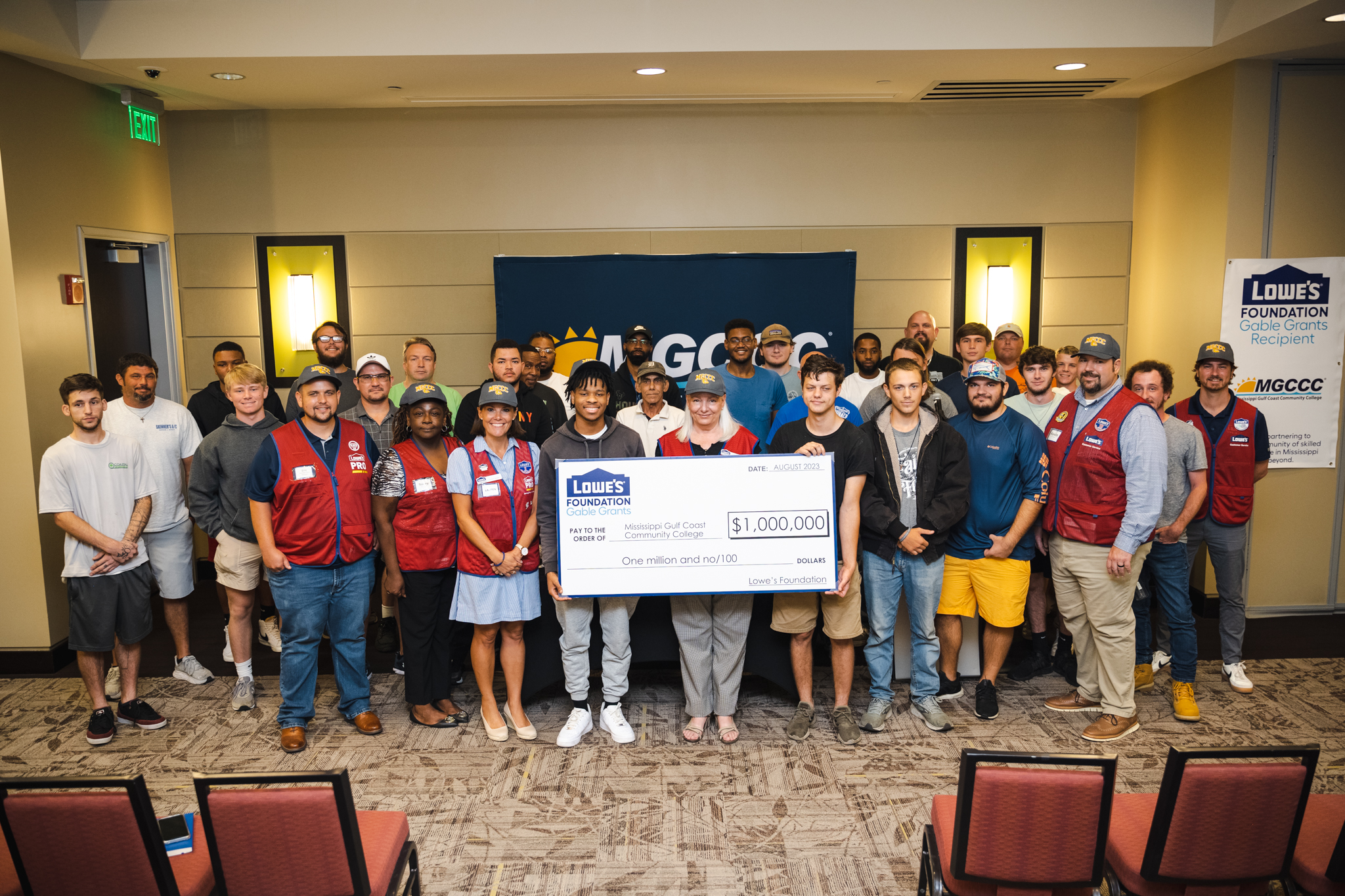Lowe’s Foundation Gable Grant of $1 Million will help MGCCC bridge skilled-trades labor gap

A check presentation was held on August 29 representing the $1 million in grants the Lowe’s Foundation has provided to Mississippi Gulf Coast Community College to help expand the college’s career and technical training programs. As the United States faces a critical shortage of skilled-trades workers in fields such as HVAC, electrical, drafting, manufacturing, and construction, MGCCC is taking significant steps to bridge this labor gap. Thanks to the support of the Lowe’s Foundation Gable Grant program, MGCCC is offering enhanced training opportunities, scholarships, internships, apprenticeships, and job-placement assistance to students pursuing careers in key skilled trades industries.
Recent statistics indicate that fewer than nine percent of workers aged 19-24 are entering the skilled trades, despite the lucrative earning potential, with salaries ranging from $54,000 to $67,000 per year. MGCCC is addressing this challenge by expanding its career and technical programs to equip students with the necessary skills and expertise to succeed in these high-demand industries.
Dr. Jordan Sanderson, associate vice president of Reporting & Data Analytics at MGCCC, emphasized the urgency of the skilled-trades worker shortage, saying, “The impending retirement of a majority of skilled trades professionals within the next decade, coupled with negative perceptions and rising demand, has created a significant workforce shortage. MGCCC is committed to filling this gap by offering relevant, hands-on training programs.”
Key skilled trades programs at MGCCC supported by the Lowe’s Foundation Gable Grant include Heating, Air Conditioning, and Refrigeration Technology (HVAC); Electrical Technology; Construction Engineering Technology; Precision Manufacturing and Machining Technology; and 3D Modeling and Design Technology. These programs are designed to provide students with the skills necessary to secure stable, high-paying jobs in industries that are essential to the nation’s infrastructure.
The exceptional success of MGCCC’s career and technical programs is attributed to close partnerships with industry leaders, ensuring that students are well-prepared for employment upon graduation. Sanderson highlighted the impressive job placement rates of more than 90 percent for most career and technical program graduates, as well as their high pass rates on industry credential exams.
Betsy Conway, director of the Lowe’s Foundation, commended MGCCC’s commitment to workforce development and the community. “We selected colleges like MGCCC due to their deep community engagement and ability to adapt to the evolving needs of the skilled trades industry. These innovative training programs are instrumental in creating a sustainable and inclusive workforce that our country requires.”
A notable highlight of MGCCC’s grant program is the introduction of the Commercial and Residential Construction Technology program at the George County Correctional Facility in Lucedale. Obey Parker, an instructor at MGCCC leading the training at the correctional facility, shared that the program will cover a range of trades, including carpentry, electrical, masonry, and plumbing.
Thanks to the Lowe’s Foundation Gable Grant, MGCCC has secured the necessary funds to establish this program and provide opportunities for individuals who need it the most. The grant period spans two years, but the equipment installed at the correctional facility will enable MGCCC to sustain the program well into the future.
“Through careful market research, we have ensured that our graduates will have viable job opportunities upon release,” Sanderson affirmed. “We are dedicated to helping all of our graduates succeed in their chosen career paths.”
Mississippi Gulf Coast Community College’s partnership with the Lowe’s Foundation underscores the critical role of education and community collaboration in addressing the shortage of skilled trades workers. As MGCCC continues to empower students with practical skills and industry expertise, it is contributing to the cultivation of a robust and capable workforce that is essential for the nation’s economic prosperity.
